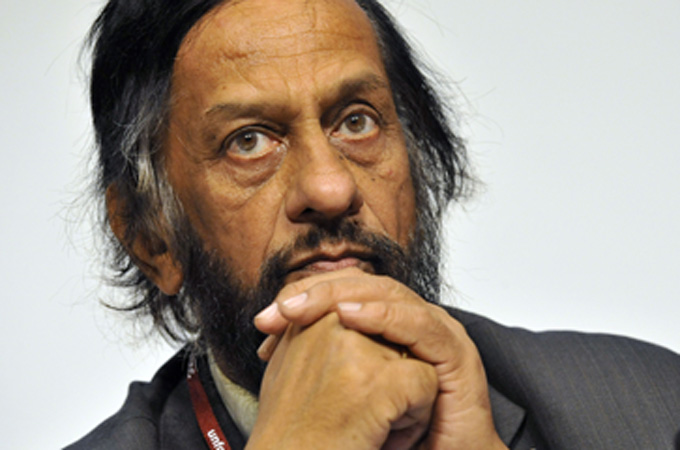UN climate body urged to reform
International review group says IPCC must “fundamentally reform” its structure to avoid future errors.

 |
| Rajendra Pachauri, head of the IPCC, criticised ‘ideologically driven’ attacks on his organisation [GALLO/GETTY] |
A review of the UN’s climate change panel has shown that the body needs to “fundamentally reform” its structure to avoid repeating the errors it committed in a report it published in 2007.
The InterAcademy Council, which groups together 15 leading science academies, urged the Intergovernmental Panel on Climate Change (IPCC) to only make predictions when it has solid evidence and to avoid involvement in policy advocacy.
Keep reading
list of 4 itemsLost Futures
Photos: Greek valley that became a lake stirs drought debate
Botswana threatens to send 20,000 elephants to Germany
The IPCC, a body that won a Nobel Prize in 2007, was hit with a wave of criticism after acknowledging in January that its 2007 global warming report had exaggerated the pace of Himalayan glaciers melting.
It had previously said the report overstated how much of the Netherlands is below sea level.
The United Nations ordered the review by the InterAcademy Council after a political uproar over its 2007 study that critics called the “Climategate” scandal.
In its study, published on Monday, the review group, supported by the academies of science from the US, Netherlands, Britain and other countries, said: “Qualitative probabilities should be used to describe the probability of well-defined outcomes only when there is sufficient evidence.”
“Straying into advocacy can only hurt IPCC’s credibility.”
The review found that the IPCC has been “successful overall” but called for changes in its leadership structure, stricter guidelines on source material and a check on conflicts of interests.
Youba Sakona, a scientist at IPCC, told Al Jazeera that criticising the structure of the organisation is “normal”.
“The IPCC secretariat was put in place on an interim basis, nothing has been changed since [its]beginning,” he said.
“[Since then] the IPCC has grown, [gained] more influence and attracted the interest of policy makers and the public at large. And from that there is the need strengthen the work of the secretariat.”
‘Ideological attacks’
Rajendra Pachauri, the IPCC chief, said that member nations of climate change body will decide whether or not to replace him following this review.
Pachauri, a vocal advocate for tough action against global warming, also criticised what he called “ideologically driven” attacks on the IPCC, which he has led since 2002.
While Pachauri acknowledged that the reputation of the IPCC had been tainted by the errors, he insisted the core assertion that the world is heating up has not been challenged.
Harold Shapiro, the chairman of the review and former president of Princeton University, said: “I think the errors made did dent the credibility of the process. There’s no question about it.”
“Trust is something you have to earn every year …We think what we recommended will help.”
The IPCC’s 2007 Fourth Assessment Report pointed to evidence that climate change was already hurting the planet, building momentum for global action to limit carbon emissions that mostly come from burning coal, gas and oil.
However, in the run-up to a highly anticipated climate summit in Copenhagen in 2009, the IPCC was rocked by a scandal involving leaked emails which critics say showed that they skewed data.
Questionable science
Ban Ki-moon, the UN secretary-general, had acknowledged there were a small number of mistakes in the report, a document that cited more than 10,000 scientific papers.
However, he also insisted its fundamental conclusions were correct.
Critics of the idea of mandatory limits on so-called greenhouse gas emissions have said the IPCC errors show the science behind global warming is questionable.
The UN has been concerned that focusing only on IPCC errors could undermine the broader UN message that climate change is a real phenomenon requiring urgent action.
The next IPCC report on climate change will be published in 2013 and 2014.
The body was set up in 1988 by the World Meteorlogical Organisation and the UN Environment Programme.